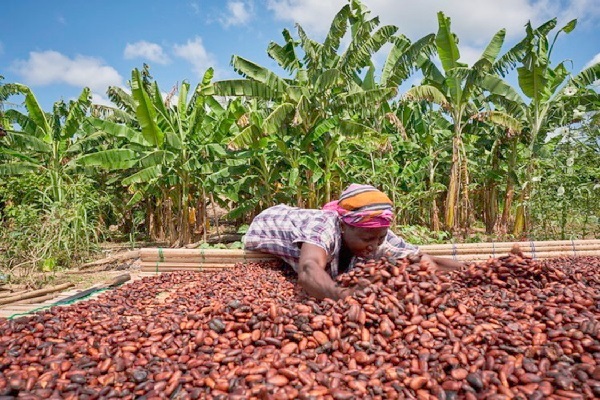President of the Association of Ghana Industries (AGI), has issued a firm warning about the potential long-term consequences of a tariff gap between Ghana and Côte d’Ivoire following the United States’ imposition of a 10% duty on Ghanaian exports, including cocoa.
Speaking on PM Express Business Edition on Joy News, Thursday, Dr. Humphrey Ayim-Darke, cautioned policymakers against viewing the current trade development in isolation, urging a coordinated regional response that takes into account the delicate fiscal dynamics both countries face.
“We are concerned about the disparity between the tariffs on Ghana and Ivory Coast,” he said.
“We are together seeking to harmonise our total cocoa export and the benefits to the farmers. Now within 10% they are being 14. So what will be the impact on our trade?”
The AGI President said Ghana cannot afford to make decisions based on short-term relief, warning that even a seemingly advantageous 10% tariff could backfire in future.
“When we think that, oh, we have a 10% [tariff], it is good for us—look, once today you are happy, the next time, it will all catch up with you,” he warned.
He described the 90-day grace period before the U.S. tariff takes effect as “a window of opportunity” for consultation and strategic planning.
“But for the 90-day pause, we would have been in a higher anxiety,” he said. “For now, we are taking the opportunity to consult, engaging government and our counterparts.”
He stressed that Ghana must use the pause to engage in collective action with regional partners like Côte d’Ivoire to prevent being outcompeted in international markets.
“It will be useful if the country does some form of collective engagement. Look at the regional bloc.”
Dr. Ayim-Darke also outlined the wider economic risks the tariff poses to Ghana’s macroeconomic stability.
“Are you worried about the uncertainty and the impact on fiscal and revenue as well? Oh yes,” he replied, “because it has a ripple effect.”
He explained that the country’s fiscal space is already narrow, with a significant portion of government revenue—over 50%—coming from imports and exports.
“Unfortunately, we know we had a cocoa drop by virtue of the events of the galamsey and the cocoa export. Leave that of the crude oil aside.”
He noted that any disruptions to cocoa exports will directly impact the government’s ability to balance its budget and maintain macroeconomic stability.
“The Finance Minister knows that if he doesn’t get it right, you have a tough time balancing his books, getting his revenue…Government has a big concern to put its head on the line to make sure it gets some certainty in the cocoa market.”
Dr. Ayim-Darke also warned of the indirect effects of the U.S. tariff on exchange rates, lending costs, and even remittances.
“If you’re not getting enough domestic build, you slap more monetary policies on us, and it will trigger the policy rate, lending rates. The cycle continues, and it has a consequential effect on the US dollar as well, which is a medium of trading.”
On the topic of remittances, he added, “Remittances have become part of our inflows. If the inflationary rate hits the U.S., by virtue of the tariffs… and the consumer’s disposable income is reduced, how much remittances will come to your family? That will affect government.”
In the end, Dr. Ayim-Darke’s message was clear: Ghana must look beyond the surface of the 10% U.S. tariff and act fast to avoid falling behind its neighbours.
“You cannot look at this in isolation,” he said. “It’s a macro and micro picture we must urgently address.”
DISCLAIMER: The Views, Comments, Opinions, Contributions and Statements made by Readers and Contributors on this platform do not necessarily represent the views or policy of Multimedia Group Limited.
